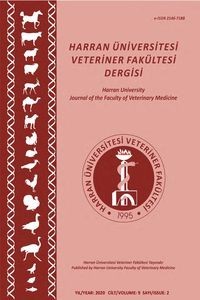Kronik Olgularda Poliheksanid/Polyheksametilen Biguanid Yara Örtüsünün Klinik Etkinliğinin Araştırılması
Abstract
Poliheksanid/poliheksametilen biguanid (PHMB), doku uyumluluğu son derece yüksek, "sitotoksisite" derecesi düşük ve günümüzde en sık kullanılan yara antiseptiklerinden biridir. Sunulan çalışmada; farklı sebeplere bağlı olarak kronik enfekte yara oluşumu ile kliniğimize gelen olguların tedavisinde % 0,1 PHMB içeren antimikrobiyal jel ve spreyin yara iyileşmesi üzerine etkinliğini araştırmak amaçlanmıştır. Çalışmanın materyalini; S.Ü. Veteriner Fakültesi Cerrahi Kliniği’ne vücudun çeşitli bölgelerinde kronik, enfekte ve ülseratif yara şikayeti ile getirilen 12 kedi ve 8 köpek oluşturdu. Yara yatağının değerlendirilmesinde; yaranın rengi, derinliği, şekli, büyüklüğü, eksudat tipi ve miktarı, yaranın lokalizasyonu ve yara bakım şartları göz önünde bulunduruldu. Yaranın şirurjikal ya da mekanik yüzeysel debritmanı yapıldı. Bu işlemin ardından %0,9’luk serum fizyolojik ile yara bölgesinin irrigasyonu sağlandı. Bütün hastaların yara bölgesine günde iki kez olmak üzere önce %0,1 PHMB içeren antimikrobiyal (Actolind® w Solution, ACTO Pharma, Germany) sprey, 5 dakika sonra aynı ürünün jeli uygulanarak koruyucu pansuman yapıldı. Yara yatağı 15. günde değerlendirildiğinde 19 hastanın yaralarında (%100) granülasyon ve epitelizasyonun oluştuğu, bu süre içerisinde sadece 1 hastada epitelizasyon gözlendi. 30. gün sonunda 1 olgu dışında bütün olgularda granulasyonun tamamlanıp epitelizasyon aşamasına geçtiği kaydedildi. Klinik olguların tamamında tedavi sürecinde herhangi bir komplikasyonla karşılaşılmadı. Poliheksanid/poliheksametilen biguanid’in klinik çalışmaları umut vericidir. Bu çalışmaya dahil olan olgularda da kısa süre içinde olumlu geri dönüş alınmıştır. Fakat, kronik yara tedavilerinde %0,1’lik PHMB uygulamalarının geliştirilebilmesi için daha fazla kontrollü deneysel ve klinik çalışmalar ile detaylı laboratuvar değerlendirmelerine ihtiyaç vardır.
References
- 1. Boateng JS, Matthews KH, Stevens HNE, Eccleston GM, 2008: Wound healing dressings and drug delivery systems: A review. J Pharm Sci, 97(8), 2892-2923.
Investigation of the Clinical Effectiveness of Polyhexanid/Polyhexamethylene Biguanide Wound Dressing in Chronic Cases
Abstract
Polyhexanid/polyhexamethylene biguanide is one of the most used wound antiseptics, with a high tissue compatibility and low cytotoxicity. In the present study, it was aimed to investigate the effectiveness of antimicrobial gel and spray that containing 0.1% PHMB, on wound healing in the treatment of patients who come to our clinic with chronic infected wound formation due to different reasons. The materials of the study consisted of 12 cats and 8 dogs with chronic, infected, ulcerative and suppurative wounds in various parts of the body, which were treated at the Surgery Clinic of SU Faculty of Veterinary Medicine. In the evaluation of the wound bed, the color, depth, shape, size of the wound, type and amount of the exudate, localization of the wound, and wound care conditions were taken into consideration. Surgical or mechanical superficial debridements of the wound were performed initially. Following this procedure, irrigation of the wound area was achieved with 0.9% saline. Protective dressing was applied to the wound area of all patients by applying antimicrobial (Actolind® w Gel, ACTO, Germany) spray containing 0.1% PHMB twice a day, and gel of the same product after 5 minutes. When the wound bed of the cases were evaluated on the 15th day, (100%) granulation and epithelization occurred in all the wounds of 19 patients, and only in one patient epithelization was observed. At the end of the 30th day, it was noted that granulation was completed in all cases except one case and passed to the epithelization stage. In all clinical cases, no complications were encountered during the treatment process. Clinical studies of polyhexanide/polyhexamethylene biguanide are promising. In this study, positive response was obtained in a short time. However, more experimentally controlled clinical and laboratory studies are required in order to improve 0.1% PHMB applications in chronic wound treatments.
References
- 1. Boateng JS, Matthews KH, Stevens HNE, Eccleston GM, 2008: Wound healing dressings and drug delivery systems: A review. J Pharm Sci, 97(8), 2892-2923.
Details
| Primary Language | English |
|---|---|
| Subjects | Veterinary Surgery |
| Journal Section | Articles |
| Authors | |
| Publication Date | December 23, 2020 |
| Submission Date | October 28, 2020 |
| Acceptance Date | November 2, 2020 |
| Published in Issue | Year 2020 Volume: 9 Issue: 2 |



